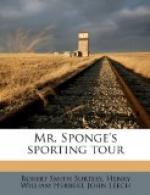He kept his hand in his pocket till he came close up to the gate, when, suddenly drawing it out, he said:
‘Oh, hang it! I’ve left my purse at home! Never mind, drive on,’ said he to his host; exclaiming to the man, ’it’s Mr. Crowdey’s carriage—Mr. Jogglebury Crowdey’s carriage! Mr. Crowdey, the chairman of the Stir-it-stiff Poor-Law Union!’
‘Sixpence!’ shouted the man, following the phaeton with outstretched hand.
‘’Ord, hang it (puff)! I could have done that (wheeze),’ growled Jogglebury, pulling up.
‘You harn’t got no ticket,’ said Coppers, coming up, ‘and ain’t a-goin’ to not never no meetin’ o’ trustees, are you?’ asked he, seeing the importance of the person with whom he had to deal;—a trustee of that and other roads, and one who always availed himself of his privilege of going to the meetings toll-free.
‘No,’ replied Jog, pompously handing Sponge the whip and reins.
He then rose deliberately from his seat, and slowly unbuttoned each particular button of the brown great-coat he had over the tight black hunting one. He then unbuttoned the black, and next the right-hand pocket of the white moleskins, in which he carried his money. He then deliberately fished up his green-and-gold purse, a souvenir of Miss Smiler (the plaintiff in the breach-of-promise action, Smiler v. Jogglebury), and holding it with both hands before his eyes, to see which end contained the silver, he slowly drew the slide, and took out a shilling, though there were plenty of sixpences in.
This gave the man an errand into the toll-house to get one, and, by way of marking his attention, when he returned he said, in the negative way that country people put a question:
‘You’ll not need a ticket, will you?’
‘Ticket (puff), ticket (wheeze)?’ repeated Jog thoughtfully. ’Yes, I’ll take a ticket,’ said he.
‘Oh! hang it, no,’ replied Sponge; ‘let’s get on!’ stamping against the bottom of the phaeton to set the horse a-going. ‘Costs nothin’,’ observed Jog drily, drawing the reins, as the man again returned to the gate-house.
A considerable delay then took place; first, Pikey had to find his glasses, as he called his spectacles, to look out a one-horse-chaise ticket. Then he had to look out the tickets, when he found he had all sorts except a one-horse-chaise one ready—waggons, hearses, mourning-coaches, saddle-horses, chaises and pair, mules, asses, every sort but the one that was wanted. Well, then he had to fill one up, and to do this he had, first, to find the ink-horn, and then a pen that would ‘mark,’ so that, altogether, a delay took place that would have been peculiarly edifying to a Kennington Common or Lambeth gate-keeper to witness.




